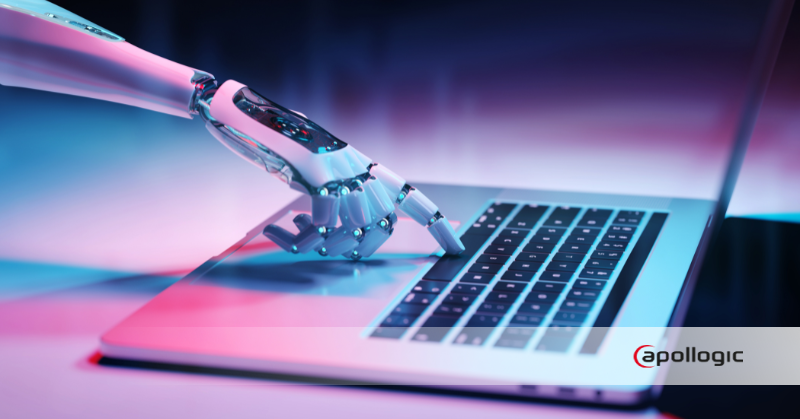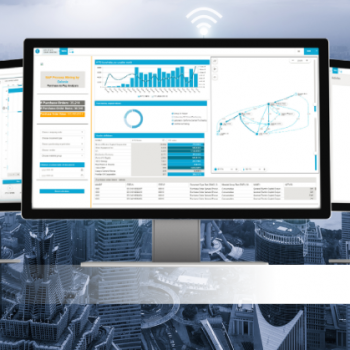Digital transformation in the world of Intelligent Enterprises is no longer a revolution, but an everyday reality – interview with Andrzej Brodniewicz, the new CTO Apollogic.

Adam Tarajkowicz, Marketing Manager
- 21th June 2019
- Career
- 5 min

Congratulations on taking up the position of Chief Technology Officer (CTO) in Apollogic. Could you tell us a few words about your experience and career path?

What will you be doing now in Apollogic, what are your goals?
My task is to ensure the highest quality of our technological offer, further professionalisation of the competence of our development and implementation team and supporting the company in building new business opportunities within the technology department. The company has invested heavily in modern cloud solutions, which has already resulted in many awards, including a triple victory in the SAP Cloud Platform Innovmatch competition. I will continue the trend of expanding our offer with new solutions in the field of Cloud Services. Companies that focus on new technologies expect that not only their customers, but also their employees will be able to work with modern products that ensure high productivity. Many years of experience gained during the implementation of CRM systems have taught me to put the end user at the center of the application development. That is why a dedicated team of UI/UX specialists always takes part in the design of user interfaces. Of course, I will continue to actively participate in projects, these are the real problems faced by our customers.
Apollogic has been helping its customers to digitally transform their business for years. Could you tell us what you think such a digital transformation is all about?
Digital transformation in the world of Intelligent Enterprises is no longer a revolution, but an everyday reality. It is based largely on the most valuable resources of these organizations, which is data. McKinsey has conducted research related to the evaluation of transformation, which shows that today barely one in three such transformation processes have increased measurably the efficiency of the company’s operations. On the other hand, the analyses leave no doubt that it is the lack of such transformation that will be the most frequent cause of company bankruptcies in the future. Let’s take an example of what such services as Netflix or Uber did to their analog competition. Therefore, the IT industry and the market in which it operates are faced with huge challenges, which will be easier to overcome as more advanced tools are implemented. The current cloud offer allows to accelerate the digital transformation by lowering costs, which is the main barrier to entering new technologies such as artificial intelligence, machine learning or advanced predictive analytics. This is particularly important for the SME segment. Thanks to this, they can use the same tools as the largest international corporations without exposing themselves to the risk of expensive infrastructure. Many Polish customers have already become accustomed to digital transformation. They understand the need to open up to external services and see the added value of cloud technologies such as flexibility, easier expansion and simplification of internal IT departments.
In recent years, solutions based on artificial intelligence algorithms have played an increasingly important role in building competitive advantage. How did AI change todays business and when can we say that the company is ready to implement it?
There can be no real digital transition without smart technologies embedded in the business processes of enterprises. Artificial Intelligence (AI) is becoming the standard for next-generation ERP tools. We help customers understand not only why they should invest in intelligent systems, but also how they should do it. Artificial intelligence allows us to process millions of records today, predict trends, categorize large volumes of data. Take, for example, marketing processes that work in many channels of interaction with customers. Intelligent systems can predict sales opportunities and their quality on the basis of a huge amount of data on the microinteractions of customers during their digital journey with a potential product or service. This helps the business to meet the expectations of their customers and to be more proactive. Intelligent Technologies are much cheaper and more accessible than they were a few years ago. The answer to the question of whether a company is ready for implementation may be trivial like ‘Is my direct competition using AI’, ‘Do I know what my company can achieve with AI’, ‘Can I automate recurring activities in my organization’. But more important is the question about the effectiveness of the implementation of such tools. Many modern homes are equipped with advanced automation, smart assistants like Alexa, but how many of them use this potential to the full benefit the users? The correct implementation of Artificial Intelligence should be led by people with vision and expertise in this field. But most importantly, it will go beyond single data silos.

Many Polish companies compete on the global market, but we know that there is still a lot of catching up to do. In your opinion, which areas should they focus on and develop faster in order to fully utilize their potential?
It is estimated that about 80% of all SAP customers are companies from the SME sector, while in Poland still only 50% are small and medium enterprises that have noticed the potential in solutions such as Ariba or C4HANA. Global corporations use their well-established position on the markets and the IT systems they have been implementing for years. Polish companies, which are often relatively young compared to their foreign rivals, have to compete with flexibility of solutions and modern technological offer. As I mentioned before, cloud solutions make the gap between investment capabilities less significant and the technological debt that separated our companies and their foreign competitors disappears. Polish companies take care of their finances very well and every zloty spent is carefully justified. At the moment, the customer can choose individual services and pay for their use instead of buying the whole business package, which is expensive to implement and even more expensive to maintain. They can choose an external service related to marketing campaign management services, add a financial brick such as JPK_VAT or JPK_VDEK in the cloud, and keep other components related to logistics in an internal data center. Thus, building a modern hybrid environment, companies become more flexible and can better adapt to the market. Digital transformation is a road, not a point on the company’s road map. In this area, Polish companies can catch up with the world leading organisations in the shortest possible time.
Thank you for your time and good luck in your new position.
Do you want to start your career in IT?
- On 21/06/2019







0 Comments